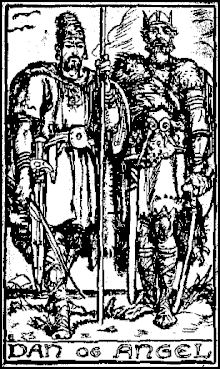Angul (mythology)

Angul (or Angel) is a figure in
Attestations
Gesta Danorum
Saxo Grammaticus' Gesta Danorum describes how the two sons of Humble, Angul and Dan, are the forefathers and founders of the Danes. Together, they became rulers of their realm through the support of their kinsmen but did not use the term "king".[1]
Angul is then described as also being the ancestor of the Angles, who later migrated to Britain, naming the region England after Angul:
| Latin text[2] | Elton & Powell translation[1] | Friis-Jensen and Fisher translation[3] |
|---|---|---|
|
Of these two, Angul, the fountain, so runs the tradition, of the beginnings of the own land. This action was much thought of by the ancients: witness Bede , no mean figure among the writers of the Church, who was a native of England, and made it his care to embody the doings of his country in the most hallowed treasury of his pages; deeming it equally a religious duty to glorify in writing the deeds of his land, and to chronicle the history of the Church.
|
Old reports maintain that the own land for the island's original name. This action was highly thought of in past ages. One witness to this is Bede , a major contributor to Christian literature, who as an Englishman, took pains to bring his country's history into the sacred treasury of his books, considering it in equal piety both to pen the deeds of his motherland and to write about religion.
|
Interpretation and discussion
Relationship to other Germanic tribal beginnings
Though not mentioning Angul, his brother Dan is referred to in other medieval works as the ancestor of the Danes. In the
Inclusion by Saxo Grammaticus
In contrast to many other writers at the time that traced the descent of the nation in question to the Trojans, Saxo favoured heathen forefathers from the land itself. This was possibly intended to show that the Danes were independent from, and equal, to the Romans.
It has been further proposed that Saxo included Angul in his account of the origin of the Danes to emphasise the close connection between the Danes and the English.
See also
Citations
- ^ a b GD1 English.
- ^ GD1 Latin.
- ^ Friis-Jensen & Fisher 2015, pp. 18–21.
- ^ Allport 2022.
- ^ Getica, pp. 56–57.
- ^ Friis-Jensen & Fisher 2015, pp. 18.
- ^ Berend 2018, p. 82.
- ^ a b Bailey 2002, pp. 59–61.
- ^ Friis-Jensen & Fisher 2015, pp. 19–20.
- ^ Chismol 2018, p. 12.
- ^ Hordern 2004, pp. 15–16.
- ^ Friis-Jensen & Fisher 2015, pp. 18–21, 594–597.
Bibliography
Primary
- Friis-Jensen, Karsten; Fisher, Peter (2015). Gesta Danorum: the history of the Danes. Oxford: Oxford University Press. ISBN 9780198205234.
- Grammaticus, Saxo. The Danish History, Book 1. Translated by Elton, Oliver; Powell, Frederick. Retrieved 30 April 2023.
- Grammaticus, Saxo. Gesta Danorum, Liber 1, Caput 1. Retrieved 30 April 2023.
- Jordanes (1915). The Gothic history of Jordanes in English version;. Translated by Mierow, Charles. Princeton, Univ. Press. Retrieved 8 May 2023.
Secondary
- Allport, Ben (2022). "The Prehistory of Frá Fornjóti ok hans ættmönnum: Connections with the Chronicon Lethrense and their Consequences". Neophilologus. 106 (3): 513–532. ISSN 0028-2677.
- Bailey, Christopher (2002). Saxo Grammaticus: History and the Rise of National Identity in Medieval Denmark. Eastern Illinois University.
- Berend, Nora (2018). "How many medieval Europes? The 'Pagans' of Hungary and Regional Diversity in Christendom". The medieval world (Second ed.). London. pp. 72–87. ISBN 9781315102511.)
{{cite book}}: CS1 maint: location missing publisher (link - Chismol, Guillem (2018). "Estado, nación y sentimiento nacional en la Baja Edad Media". Mirabilia/MedTrans: Mirabilia/Mediterranean and Transatlantic Approaches to the Culture of the Crown of Aragon (in Catalan) (1): 2–24.
- Hordern, Kjersten Anne Talsnes (2004). "A postcolonial reading of the Middle English romance "Havelok the Dane"". University of Regina. Faculty of Graduate Studies and Research, University of Regina.
